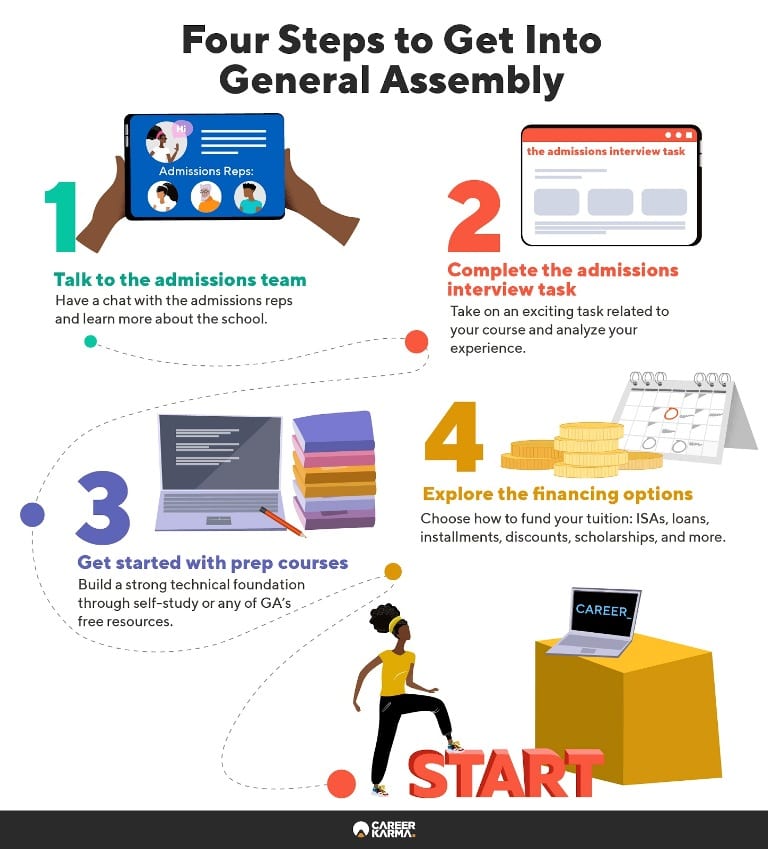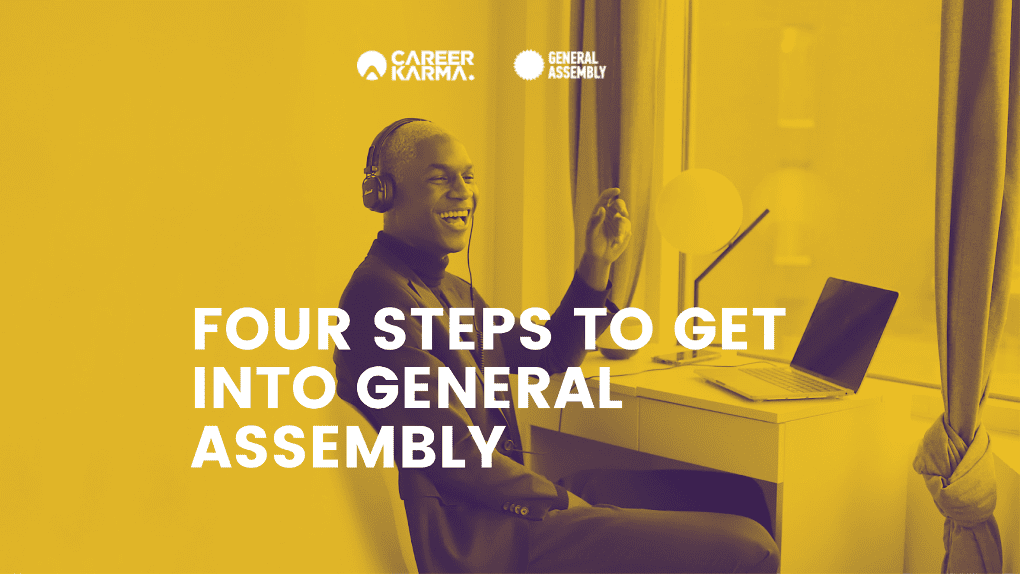If you’re looking to change your career, chances are the thoughts of joining the tech industry have crossed your mind at least once. It makes sense: tech is one of the most resilient and robust fields with a strong career outlook. Although tech hiring took a slight hit when Covid-19 first came into the picture, industry players are optimistic about tech employments in 2021.
Tech jobs also come with handsome paychecks. This is confirmed by multiple reports including Glassdoor’s annual 50 Best Jobs in America for 2020 list which sees tech professionals earning anything between $75,000 to $142,000 per year.
While all that sounds well and good, the question remains, “How do I get there?”
How to Start a Tech Career with No Experience
Well, the answer to that boils down to your preferences, capacities, and goals. Coding bootcamps, for instance, are growing in popularity among school leavers and career-changers because the programs are structured to help expedite your job-finding process. The best part is, most bootcamps are designed to ease your transition into tech, regardless of your background.
General Assembly Acceptance Process
Take General Assembly, one of the first coding bootcamps, that’s been on the scene since 2011. Over the years, the school has acted as a bridge that connects thousands of tech aspirants with their dream careers in Data Science, Software Engineering, UX Design, and Digital Marketing. As shown by the General Assembly acceptance rate, the school has done an outstanding job: 99.2 percent of graduates who participated in its full-time career services secured a job in their field of study.
But, what does the overall process look like? “It starts with a phone call,” Bianca Espinoza, Senior Regional Admissions Director, said.

1. Talk to the admissions team
“First, you hop on a call with an Admissions representative who will walk you through some questions about your interest, background, and previous experience. Through this conversation, we want to establish if making this career transition into tech is the right step for you,” she explained.
Through her six years of experience in admissions, Bianca said she learned that the number one indicator for a successful bootcamp experience is a full commitment to the program. This is because they are designed to be comprehensive, covering a slew of tools and technologies within a shorter time than a conventional four-year program. As such, making an informed decision is crucial.
“During the call, we’d try to understand their technical aptitude and background to determine if moving into our admissions interview is the right next step. It’s important that you know you want to commit to this and have a clear schedule,” she said.
“We have a Flex option for folks who are working full-time jobs and are trying to make a pivot. But for those who want to make a quick career transition, our full-time programs are going to be the best option. So, you have to ensure you’ll have the time to commit to this and this is going to be your main priority over the next couple of months.”
Bianca emphasized, however, that you do not need to have everything figured out when making that first contact. Your GA admissions advisor acts as your personal thought partner. That means they will work with you to determine a career path that aligns both your interest and career goals.
“It’s good to hop on the phone with an advisor because we will give you the framework if you’re totally new to exploring this. If you just started last week, for example, you need the advice to go through the process. Not all students are ready to commit to that interview through that first conversation. Sometimes it takes weeks or months. But, we also hold you accountable for making that happen.”
Once you’ve passed this step, you’ll move on to the admissions interview task.
2. Complete the admissions interview task
The admissions interview task is meant to give prospective students a taste of what the program and the career field would be like. You will be assigned different projects depending on the course that you plan to take, which must then be submitted within three to four days.
“This is not a technical test. It’s more like your chance to explore new topics and have fun with it,” Bianca said.
“After submitting your project, you will meet with your admissions advisor to discuss the project. They’d ask questions surrounding your experience, like, ‘What are some of the challenges you faced?’ or ‘What was the most exciting part of that project?’ All these questions are meant to assess if you’re ready to make that commitment to an immersive program.”
Here are some examples of General Assembly’s admissions interview tasks:
Software Engineering Immersive
Deliverables: Make your first web page using HTML, JavaScript, and CSS. You will be working independently while utilizing a guided tutorial.
UX Design Immersive
Deliverables: Conduct user research for a hypothetical company based on a prompt given. You are expected to tap into your own network (friends, family, social media users, etc.)
Data Science Immersive
Deliverables: Analyze real datasets from Kickstarter. Evaluate it to tell a story for a hypothetical marketing team that is looking to market Kickstarter.
3. Take General Assembly prep courses
While General Assembly is open to everyone regardless of experience, Bianca said that some students partake in self-study prior to their enrollment.
“You can go through at least a few weeks of self-study to determine if you really like this. Because, if you go in cold turkey, you may realize during the program that maybe this is not a good use of your time,” she said.
“We know this is a huge financial commitment so our advice is you should go on different tutorials and do some coding on your own. We ask for a foundational understanding of the topics but you don’t have to be an expert at all, though.”
Depending on the program you wish to pursue, the admissions representatives may also direct you to other free resources within General Assembly like Dash, which is a self-serve coding course that teaches the basics of HTML, CSS, and some JavaScript. This also serves as a great primer for its Software Engineering Immersive program.
“The true value of GA is we’re not just a bootcamp, we have professional development workshops too. We have ways for you to engage with the content for free. We have a lot of tools within GA to send somebody to, like these exploratory courses,” Bianca explained.
Additionally, all students are also required to complete 30 hours of pre-work before moving on to specialized topics. The pre-work stage will take students through front end development with a focus on JavaScript. This is meant to help students build a strong technical foundation and provides an equal starting point for everyone.
4. Explore General Assembly financing options
Once you’ve completed your admissions task, your admissions advisor will walk you through all the financing options available:
Education Loans
General Assembly works with credible lender partners to offer students a variety of education loans with different terms, interest rates, and payback periods. Most recently, the school launched a 0% Interest 24-month loan option for its full-time Immersive courses.
Installment Payment Plan
One of GA’s most popular financing options, the payment plan lets students spread tuition payments over the duration of their course, conveniently split into two, three, or four installments.
Tuition Discount for Women
See Her Excel is a $1,500 tuition discount, meant to empower more women to secure their place in the tech industry. It is open to all students who self-identify as a woman, transgender person, genderqueer, or non-binary person. This initiative is in tandem with General Assembly’s commitment to championing diversity and inclusion at all levels.
Pay Upfront With Tuition Discount
Students receive a $450 discount when paying full tuition upfront for any immersive course. Similarly, those paying full tuition for any evening or one-week course at General Assembly receive a $250 discount.
General Assembly’s Catalyst Program
This is a deferred payment plan, or an Income Share Agreement loan, which will see students going through a program at zero cost until they graduate. Once they make a minimum of $40,000 a year, they will pay back 10 percent of their monthly salary over the course of 48 months. Total payment is capped at 1.5x tuition.
Check out the full list of the financing options on the school’s website. It also offers several other scholarships and partner-supported programs to help make tech education more accessible to everyone.
What Happens After You Get In
Once enrolled in any of the Immersive programs, you’ll start working on your curriculum which covers in-demand tech tools that will help transform you into professionals. The curriculum is taught by expert instructors who have accumulated years of industry experience under their belts.
However, acquiring technical skills is only half of the work. The other half is mastering the know-how behind the job finding process. To take it one step further, General Assembly offers Career Services that includes one-on-one sessions and personalized support from Career Coaches.
Your Career Coach will help you map out a career plan, set important goals, and keep you on track with your job search. You will learn how to develop your professional brand, polish your presence, write solid resumes, and practice interviewing skills. You will also be exposed to the employment landscape, which can help you take better advantage of career opportunities that come your way.
“The reason you want to make a career change is that you’re probably unhappy where you are and you’re looking for something more fulfilling. General Assembly is here to make sure you have everything you need in order to make that big life change,” Bianca said.
If you’re ready to start exploring, General Assembly’s team is just one call away.
About us: Career Karma is a platform designed to help job seekers find, research, and connect with job training programs to advance their careers. Learn about the CK publication.




